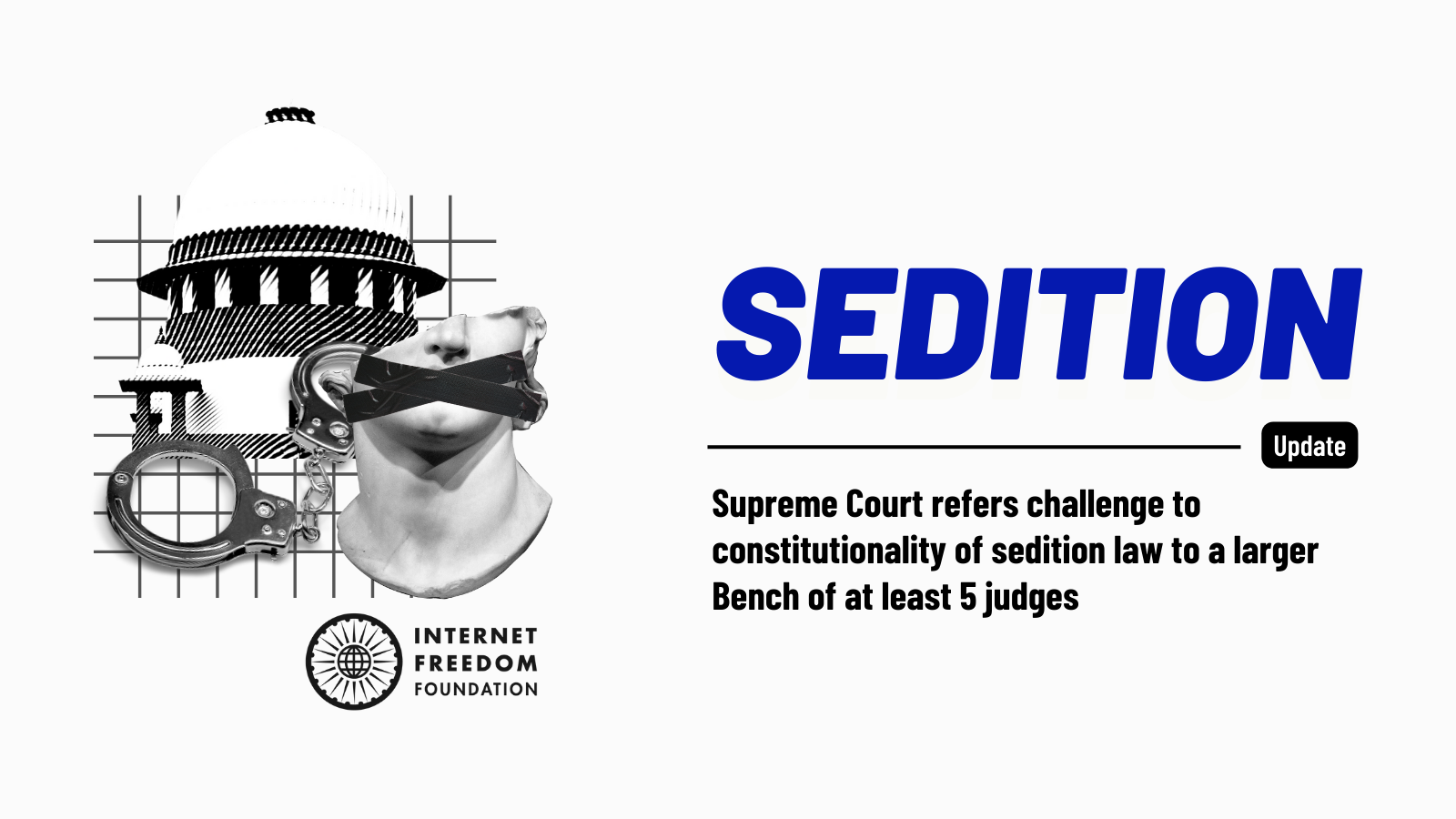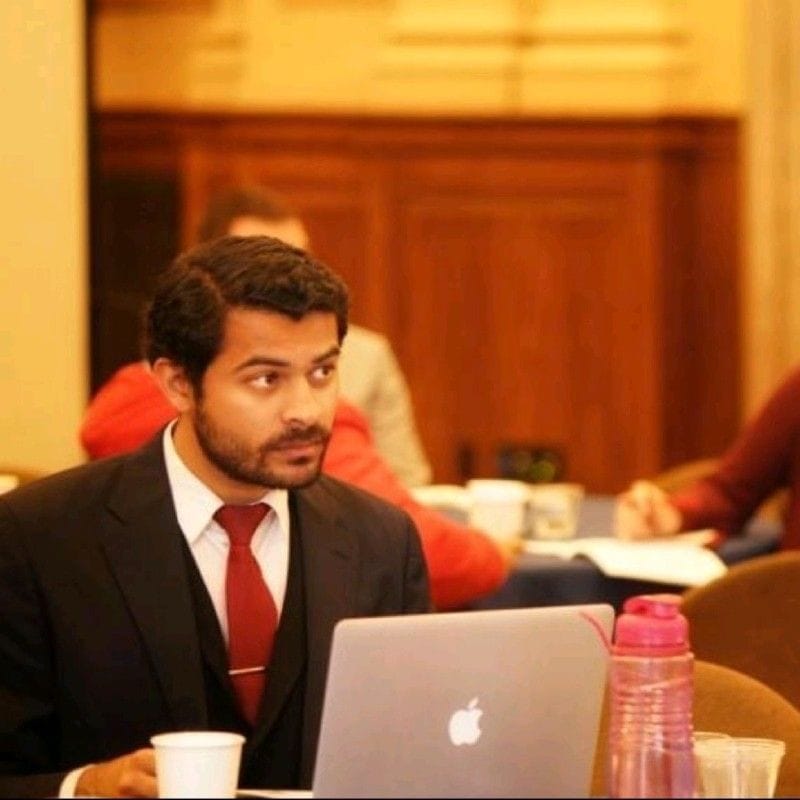
tl;dr
On September 12, 2023, a 3-judge bench of the Supreme Court referred the petitions pertaining to the challenge to the constitutionality of Section 124-A of the Indian Penal Code, 1860 (“IPC”), i.e., the sedition law, to a Bench of at least 5 judges. The development arose after the Chief Justice of India (“CJI”) observed that as the question of constitutionality of Section 124-A required doubting Kedar Nath Singh v. State of Bihar, which was a decision rendered by a Constitution Bench, it could only be decided by a bench of 5 judges or more.
Why should you care?
The law of sedition (Section 124-A, IPC), was inserted by the British colonial government in 1870 to suppress the independence movement, but even after independence, S. 124-A has remained on our statute books. Shortly after independence, the law was upheld by a 5-judge bench of the Supreme Court in Kedar Nath Singh v. State of Bihar (1962). Now, a bench of at least 5 judges will reopen the matter, and review the validity of Kedar Nath Singh in modern India.
Proceedings before the Supreme Court
On September 12, 2023, a 3-judge bench of the Supreme Court led by the CJI held that as the challenge to the constitutionality of Section 124-A IPC required reviewing the judgement in Kedar Nath Singh, it would not be appropriate for a smaller bench to do the same. Accordingly, the petitions have been referred to a larger bench of at least 5 judges.
This decision came after a discussion on Kedar Nath Singh where the Court observed that the said judgement had only examined Section 124-A from the perspective of Article 19, and not Articles 14 and 21.
Though a request had been made by the Hon’ble Attorney General and Hon’ble Solicitor General that the proceedings in the matter could be deferred on account of the introduction of new Bills, overhauling Indian criminal law and the penal code, in the Parliament, this was turned down by the Court on the ground that even if the new Bill became law, the past cases under Section 124-A would not be affected as the new penal law would only apply prospectively.
Background
In May, 2022, the Union of India filed a counter-affidavit stating that the Government of India had decided to “re-examine and reconsider” Section 124-A of the IPC before an “appropriate forum where such reconsideration is constitutionally permitted”. On this basis, the Union Government sought to adjourn the matter. Nevertheless, on May 11, 2022, the Supreme Court passed a historic Order, keeping all pending trials, appeals and proceedings under Section 124-A of the IPC in abeyance till the re-examination of the sedition law is complete.
Subsequently, the 22nd Law Commission of India released its 279th Report titled, ‘Usage of the Law of Sedition,’ recommending the retention of the provision of sedition. Further, on August 11, 2023, the Union Government introduced three Bills in the Lok Sabha to replace the IPC, CrPC and the Indian Evidence Act. But these Bills do not do away with the provision of sedition. In fact, the Bharatiya Nyaya Sanhita Bill, 2023, intended to replace the IPC, includes Clause 150, which introduces a new provision closely resembling the sedition law, albeit without explicitly mentioning it by name.
However, the new provision has received criticism from legal experts, academics and activists. Among other things, the new provision has been criticised for suffering from vagueness, for criminalising dissent and lowering the threshold of harm. It is clear that the Union Government is merely attempting to skirt the challenge to sedition by bringing about reformation of the sedition law on paper, while in substance, it is expanding the scope of the same provision.
Why is Sedition Unconstitutional?
In September 2021, Journalist Union of Assam (‘JUA’), with the legal support of IFF, filed a petition before the Supreme Court, challenging the constitutional validity of Section 124-A of the IPC. The following grounds were raised in the said petition:
- Violation of Article 19(1)(a) of the Constitution: In the 1962 case of Kedar Nath Singh vs Union of India, 1962 Supp (2) SCR 769, a five-judge bench of the Supreme Court upheld Section 124-A but narrowed its applicability to speech with the ‘tendency’ to incite violence. However, in Kedar Nath Singh, the Supreme Court did not define the term ‘tendency’ or establish a clear link between speech and its potential consequences. In their petition, JUA has argued that Section 124-A, as interpreted by Kedar Nath Singh, infringes upon the freedom of speech and expression as guaranteed under Article 19(1)(a) of the Constitution, as it criminalises speech unrelated to violence or public disorder, leading to a ‘chilling effect’ on speech.
- Violation of Article 14 of the Constitution: Section 124-A prescribes a punishment scheme unlike other offences under the IPC. It allows judges to impose sentences ranging from (1) life imprisonment, with a possibility of a fine, to (2) imprisonment up to three years, with a possibility of a fine, or (3) just a fine alone. Unlike other offences, such as Section 304 of the IPC (culpable homicide not amounting to murder), Section 124-A lacks clear guidance for judges on how to classify cases and determine whether to sentence a convict to life imprisonment, three years’ imprisonment, or impose just a fine. Consequently, this provision violates Article 14 by permitting arbitrariness through its sentencing framework.
- Disproportionate Impact on Journalists: Section 124-A disproportionately affects journalists and individuals whose views vary from the position of the ‘Government established by law’. Journalists, by the very nature of their job, face a higher risk of prosecution under Section 124-A. The chilling effect stemming from the threat of prosecution hampers journalists’ ability to report and fulfil their role as the fourth pillar, necessary for efficient functioning of a democracy.
‘Article 14,’ a collective of lawyers, journalists, and academics engaged in research and reporting, has shown how Section 124-A is used in practice, with a conviction rate as low as 0.1% between 2010 and 2021. Despite the low conviction rate, cases filed under Section 124-A impose significant financial and resource burdens on small organisations and freelance journalists. The threat of prosecution effectively compels journalists to self-censor, refraining from publishing controversial or critical content, regardless of its legality.
It is on these and other grounds that the Journalist Union of Assam has challenged the constitutionality of sedition in the Supreme Court.
We thank JUA for allowing us to represent them in this important matter. We are grateful to Sr. Adv. Chander Uday Singh for his guidance and advice. We are also thankful to other advocates representing other petitioners before the Supreme Court, especially Sr. Adv. Kapil Sibal and Advs. Nizam Pasha, Aparajita Jamwal, Prasanna S. and Manisha Singh.
JUA was represented by Advocate-on-Record Rahul Narayan and IFF’s legal team comprising Advocates Gautam Bhatia, Vrinda Bhandari, Abhinav Sekhri, Tanmay Singh, Radhika Roy and Gayatri Malhotra.
The matter will now be placed before the CJI on the administrative side for the formation of a Bench of at least 5-Judges. We will be present and will continue to fight towards having Section 124-A of the IPC completely struck down, and our free speech preserved.
This post has been authored by Litigation Intern Raghu Gagneja, and reviewed by Senior Litigation Counsel Tanmay Singh and Associate Litigation Counsel Radhika Roy.


